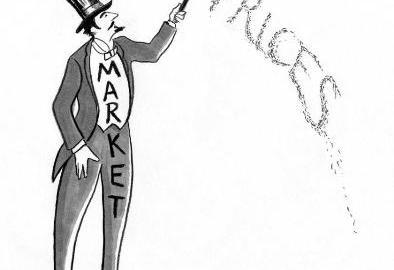What If The Price Was Never Right?

Prices are the magic in free-market stories. But what if prices were never right? Then free markets wouldn’t work as their fans claim. The ‘markets in everything’ crowd don’t tackle the following three issues well. First, the “invisible hand” can’t benignly solve every problem, rather it creates ills that need nonmarket cures. Second, self-interest often obstructs voluntary solutions. Third, self-interested winners often distort free markets.
Free-market stories rely on price signals to coordinate “spontaneous order” from innumerable voluntary (so presumed beneficial) choices. “Spontaneous” here means undesigned. No individual needs, or can have, all the information that shapes prices. Demand changes are reflected in price changes and markets adjust automatically using the “dispersed knowledge” of many. No dreaded “central planning” is needed.
But this dispersed knowledge story concentrates attention on only one type of spontaneous order: wherein individual incentives align with collective goals. But nothing guarantees that. In “Darwin’s Wedge” situations individual and group incentives diverge.
Darwin’s Wedges abound in free markets, creating openings for profitable “price errors.” For example, polluting manufacturers have incentives to not pay for cleanup. The excluded costs create errors in price signals. And dispersed self-interest complicates voluntary fixes. Both sellers and buyers “benefit” when externalized costs yield lower prices. The seeming self-interest of market participants differs from society’s. Such divergences aren’t minor imperfections that we can safely ignore.
Generally Darwin’s wedges don’t fix themselves. Collective interests require the protection of universal rules enforced by independent referees. They’re like pro-sports salary caps: rich teams buying all the best players hurts the sport overall. Some centralized restrictions on freedom in sports, and in markets, can be beneficial.
Free markets tend to undermine themselves, but not only as Marx warned from the bottom. Self-interested winners, while seeming to be market promoters, often become market distorters, as soon as they can benefit. Many corporations decry government involvement while happily pocketing public subsidies.
Better use of market magic requires attention to the underlying motives of market-fans. Market-lovers can be easily bewitched, like those that Paul Krugman says mistook “beauty, clad in impressive mathematics” for truth. They can be too rosy-eyed about business leaders: Robert Nozick implausibly believed “the future orientation of the market entrepreneur” would conserve natural resources. Some like Milton Friedman hate or distrust government, assuming they’re blundering or corrupt bureaucracies. Among business leaders many, who honestly serve their customers, pay taxes and play fair, are vital (though flatteringly casting them as heroic savior-entrepreneurs encourages arrogance). But others are lazy, favoring deregulation to make their lives easier. And some are just scoundrels seeking easier exploitation.
The price of leaving the massive power of markets to the wrong kind of market-fan is too high. Market realists should recall Upton Sinclair’s warning: we’re all motivated to discount logic that endangers our livelihoods (or pet-theories). The “free markets” vs government frame isn’t helping. Both are needed, and neither can be safely trusted, so a balance of these powers, fitted for each empirical context, is required. Or dispersed self-interest and mindless spontaneous order won’t have benign results.
Illustration by Julia Suits, The New Yorker Cartoonist & author of The Extraordinary Catalog of Peculiar Inventions.




